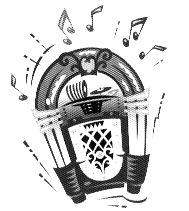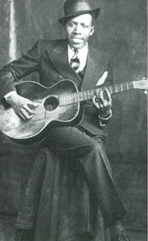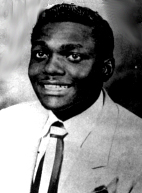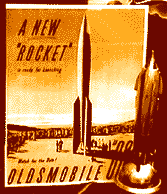|
|
|
|
 |
||
|
"How do I get myself in these situations? Is that what you’re askin’, Alice? Very simple, very easy to explain, I’VE GOT A BIIIIGG MOUTH!!!!!!!" — Ralph Kramden, New York 1955 Those are my sentiments exactly when I look at the task at hand and what I said at the end of my little car music article-letter in Vol. I No. 1 of Drag Racing Online. I like music and have a record collection in excess of 10,000; all types of stuff, from hip-hop and hard-core punk to the turn-of-the-century hotel bands. Knowing that the majority of youse guys listen to the radio and are into some kind of music, I thought that I’d share some of my tastes in records on a subject near and dear to our hearts, namely cars and/or racing. I thought for a first article I’d mention Billy Murray and "In My Merry Oldsmobile," America’s first hit car song, and then followed with the gleeful pronouncement that next issue we’d look at the blues and cars. Due to the socio-economic factors beyond my control, I am going to have to hedge a little. Put country simple, there aren’t a lot of blues car records. Why? Because, blues was, from the first Mississippi Delta efforts of the 1920's to the immediate post-war period in the country’s urban centers, a poor black man’s music. And poor people can’t buy much in the way of cars, and when they can, they aren’t something they would care to sing about. I mean today, if you could play open-handed National steel body guitar flawlessly but you were of modest means, would you wail about that ’78 Toyota Corolla of mine?" Consequently, a lot of blues songs had car-ish titles, but "Baby, Let Me Ride Your Automobile," was more about a rumble seat of a different kind … as in (gasp!) sex. When I looked through my Neil Slaven/Mike Ledbitter-penned "Blues Records, 1942-1966," a book that is the definitive post-War blues discography, I found at best maybe three dozen car songs out of 381 pages of song listings. The same percentage for Godrich and Dixon’s "Blues & Gospel Records, 1902-1942," a book comprised of about 900 pages. Soooo.... Below are a tiny handful of records that are absolute must checkouts for someone who digs blues and cars.
And secondly, Paul Williams, who published the first U.S. rock magazine Crawdaddy in 1966, wrote "The Best 100 (Rock n’ roll) Singles," in 1993. He had evergreens like Elvis’ "Heartbreak Hotel" No. 4, Buddy Holly’s "Peggy Sue" No. 9, Chuck Berry’s "Johnny B. Goode" No. 11, and "All Along the Watchtower" by Jimi Hendrix No. 56? And where was "Terraplane Blues" in all this? No. 1
MERCURY BOOGIE - K.C. Douglas (Down Town 2004) This jewel was recorded in Oakland, Calif., in 1948 and for the keen-eyed (and eared) is the same song that David Lindley had a hit with in the early 1980s. The bullet-shaped creation that Johnny Rocca and Troy Critchley are running 6.20s and 220-mph with in Pro Mod is sung to the hilt. It’s not as fast as Lindley’s version, but it’s cars and cooks. I would’ve thrown in Chuck Berry and the half-dozen or so car songs he made "Maybellene" and "You Can’t Catch Me’ being the best, but he really falls under a rock n’ roll heading rather than blues. However, don’t let this pitiful offering discourage you on the subject of the blues. Car songs or not, the blues and country traditions and jazz are this country’s most important musical contributions to the world, certainly in the first half of the century. You could wear out a lifetime chasing after great blue records and I know: I’ve tried.
- Chris Martin
|
||
|
Copyright 1999-2001, Drag Racing Online and Racing Net Source |
||
 BLUE
BLUE  TERRAPLANE BLUES - Robert Johnson
(Vocalion 03486) This record was recorded in a hotel room in San Antonio,
Texas on Monday, Nov. 23, 1936 and the singer is (along with Charley
Patton) the most influential of all pre-War blues artists. Aside from
jazz artists, Johnson is on a par with Sinatra and Elvis in terms of
music influence in this century. Like most of the great pre-War singers,
almost all that is known of him comes from oral history and financial
and recording label notations. He was born in Hazelhurst, Mississippi
in 1911, dying around 1938 or 1939 and the two known photographs of
him show a small, wiry, pleasant looking black man with predictably
long, skinny fingers. He was a superior guitarist who was years ahead
of his time, and all you need to prove it to yourself is check out the
MTV showing of Eric Clapton’s acoustic reading of Johnson’s
"Malted Milk."
TERRAPLANE BLUES - Robert Johnson
(Vocalion 03486) This record was recorded in a hotel room in San Antonio,
Texas on Monday, Nov. 23, 1936 and the singer is (along with Charley
Patton) the most influential of all pre-War blues artists. Aside from
jazz artists, Johnson is on a par with Sinatra and Elvis in terms of
music influence in this century. Like most of the great pre-War singers,
almost all that is known of him comes from oral history and financial
and recording label notations. He was born in Hazelhurst, Mississippi
in 1911, dying around 1938 or 1939 and the two known photographs of
him show a small, wiry, pleasant looking black man with predictably
long, skinny fingers. He was a superior guitarist who was years ahead
of his time, and all you need to prove it to yourself is check out the
MTV showing of Eric Clapton’s acoustic reading of Johnson’s
"Malted Milk."  "Terraplane Blues"
is a monster record. A relentless throbbing guitar and moaning Delta
vocal concerning the man’s woman and his Terraplane. As I write
that, I can feel myself say, ‘That ain’t gonna cut it.’
So I’ll leave off with two statements.
"Terraplane Blues"
is a monster record. A relentless throbbing guitar and moaning Delta
vocal concerning the man’s woman and his Terraplane. As I write
that, I can feel myself say, ‘That ain’t gonna cut it.’
So I’ll leave off with two statements. Columbia
records put out a boxed CD set of Johnson’s entire recorded output,
alternate takes and outtakes included, and it’s still available.
It also sold a million copies worldwide.
Columbia
records put out a boxed CD set of Johnson’s entire recorded output,
alternate takes and outtakes included, and it’s still available.
It also sold a million copies worldwide. ROCKET
88 - Jackie Brenston (Chess 1458) Brenston recorded this record
for Leonard and Phil Chess in Memphis, Tennessee in 1951 and it’s
a savage record, one
ROCKET
88 - Jackie Brenston (Chess 1458) Brenston recorded this record
for Leonard and Phil Chess in Memphis, Tennessee in 1951 and it’s
a savage record, one that’s been recorded numerous
times, especially by British blues revival bands of the 1960s. It’s
more rhythm and blues than blues, but cooks at full speed ahead. Of
course, Brenston’s singing about the V-8-equipped Oldsmoblie rocket
88 and all its virtues. A huge plus on this record is that the back-up
band is Ike Turner’s crew. They play it fast and tight here.
that’s been recorded numerous
times, especially by British blues revival bands of the 1960s. It’s
more rhythm and blues than blues, but cooks at full speed ahead. Of
course, Brenston’s singing about the V-8-equipped Oldsmoblie rocket
88 and all its virtues. A huge plus on this record is that the back-up
band is Ike Turner’s crew. They play it fast and tight here.